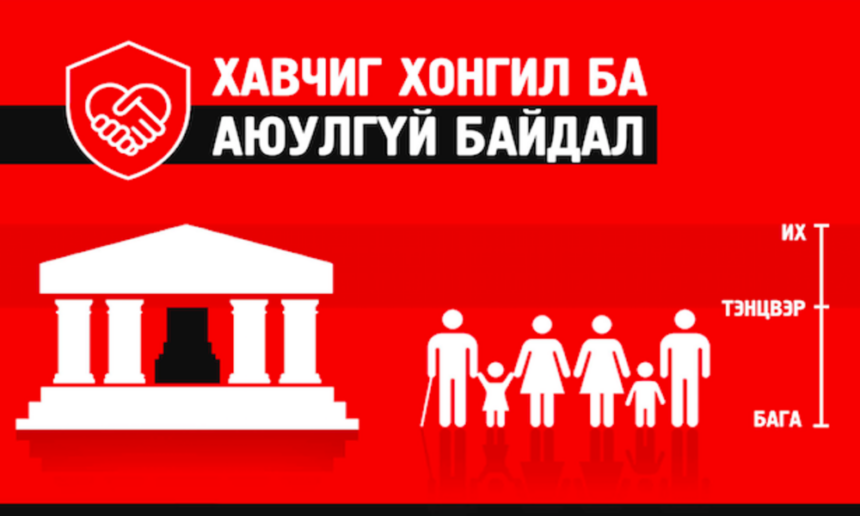(“THE VISION 2050” CRITICISM 8: A PEACEFUL AND SECURE SOCIETY)
One of the main nine targets of Mongolia’s long-term policy document ‘The Vision 2050’ which is being discussed by the Parliament, is to promote a “peaceful and secure society”. The goal is defined as “strengthening the national defense capacity, ensuring human rights and fundamental freedoms, public order, ensuring the safety of citizen’s living environment, and assuring human safety and social security by decreasing disaster risks”.
It is acknowledged that to protect external and internal security, we need to strengthen our defense and law enforcement capacity; and as well as to be able to protect our interests in cyberspace to reduce non-traditional security risks. It is worth noting how crucial our ‘third neighbor’ foreign policy is. At the same time, for Mongolia, values such as human rights, fundamental freedoms, and economic freedom, are the guarantee for the national security. The only political system that builds and guarantees these freedoms is a democratic and transparent parliamentary government.
In several cases in human history, human rights and freedoms have been gradually curtailed and dragged from democracy to authoritarian or dictatorial regimes.
The coronavirus began to threaten human health, then the country’s economy, and now citizen’s political rights and freedoms. Taking advantage of the pandemic, some authoritarian leaders are trying to expand their power (cases). For example, the ‘Coronavirus Law’ was passed in Hungary where the government increased its power of state of emergency. As public health was endangered, individual freedoms were curtailed.
The biggest challenge for Mongolia in the next 30 years, will be to maintain mutually beneficial economic and political cooperation with its two major neighbors who have authoritarian regimes, along with ensuring our democratic institutions and values. The Freedom House published an index of the regional situations of human rights and freedoms indicators.
Fig.1 Global Freedom Index
Source: Freedom House 2020
Political risk
Unlike our two neighbors, we discuss and resolve all issues in public. Criticizing and arguing takes place, instead of fighting or using weapons. Even though it is challenging to reach consensus, we live in a parliamentary democracy, where decisions must be agreed upon by a majority. However, there have been several attacks on our parliamentary democracy, including by the State Security Council (SSC) itself.
On the recommendation of the SSC, senior law and enforcement officials can be dismissed now. Indeed, these corrupt people could not be convicted of crimes by court. Now the window of opportunities exists for using this structure for political purposes. This council discussed the cancellation of pension loan debts and resolved it simply by using taxpayers’ money. Another issue that could pose a potential threat to our national security is a membership in the Shanghai Cooperation Organisation. The President has repeatedly raised all these issues in various forms. Since the SCO can potentially affect Mongolia’s security, it is worth discussing and deciding in parliament. By all means, any decision should not be leading away from parliamentary democracy -against the guarantee of Mongolian human rights and freedoms.
Economic risk
Recently, the Russian President V. V. Putin decided to launch a project for the construction of a natural gas pipeline running through Mongolia. Currently, the feasibility study is being prepared. If it turns out profitable, a gas pipeline construction will soon begin. However, citizens should as well be aware of the risks that come along with this project. Perhaps the biggest factor to consider when talking about security for the next 30 years could be the gas pipeline. The interest of the northern neighbor will grow if the gas pipeline is laid through Mongolia. In a democracy as ours, it is a big risk.
According to international media, Russia has extensive experience in manipulating elections in many countries and played a key role in the recent US election. If they begin to play a decisive role in our elections, then what kind of democracy will we be talking about? Therefore, if a gas pipeline is to be built, a tripartite joint venture must be set up, its shares sold to the public, and a non-political board of directors must be set up.
Narrow corridor
It is the government’s responsibility to protect the country’s borders and prevent internal conflicts. However, it is even more dangerous if we exaggerate the power of the state, accumulated in the hands of a few. We can observe how the social and economic situation is changing in every country where an authoritarian governor takes over. Therefore, we, Mongolians, must understand and give our utmost effort not to deviate from this path, and figure out how to maintain the rule of law and ensure our security. Scientists Daron Acemoglu and James A. Robinson, who studied the history and realities of many countries around the world, have described such process in detail in their book ‘The Narrow Corridor’. According to them, the state will prosper, and citizens will be happy only when both have equal power. The state must be able to prevent the possibility of oppression and provide basic social services to its citizens, such as health, education, and enforcement of the law. It is also mentioned that if the society is well aware, controls the state and enjoys participation, the balance of power between the state and society will be stable in the long run, and the state institutions will develop and strengthen accordingly.
Fig. 2 “The Balance of Power: States, Societies, and the Narrow Corridor to Liberty”

However, over the last 30 years, it has become apparent that building such balance is a much more difficult, long, arduous, and long-lost road. After the collapse of the previous political system, Mongolia, unlike other Central Asian countries, chose the path of parliamentary democracy, which ensures human rights and freedoms. However, Mongolia continues to fail in strengthening its citizenry and building civil society.
We, Mongolians, will be the safest and happiest nation in the next 30 years, unless we lose ourselves before the Corridor to liberty.
2020.04.15
Trans. by Riya.T and Sungerel.U












